BUS707 Research Proposal: Exploring Ethics in Accounting and Auditing
VerifiedAdded on 2023/06/09
|16
|6062
|264
Report
AI Summary
This research report delves into the critical role of ethics in auditing and accounting, particularly in light of recent corporate scandals and failures in financial reporting. It addresses the significance of ethical conduct for auditors and accountants in ensuring the reliability and accuracy of financial statements, which are vital for stakeholder decision-making. The study aims to explore how a company's ethical culture influences the behavior of accounting and auditing professionals, examining the impact of personal values and attitudes on adherence to professional codes of ethics. Key objectives include identifying factors that encourage ethical behavior, examining the role of ethical motivation, exploring the advantages of professional ethics, and investigating methods for integrating ethical audits within organizations. The research employs a comprehensive literature review and outlines a methodology for further investigation into this crucial area of business ethics.
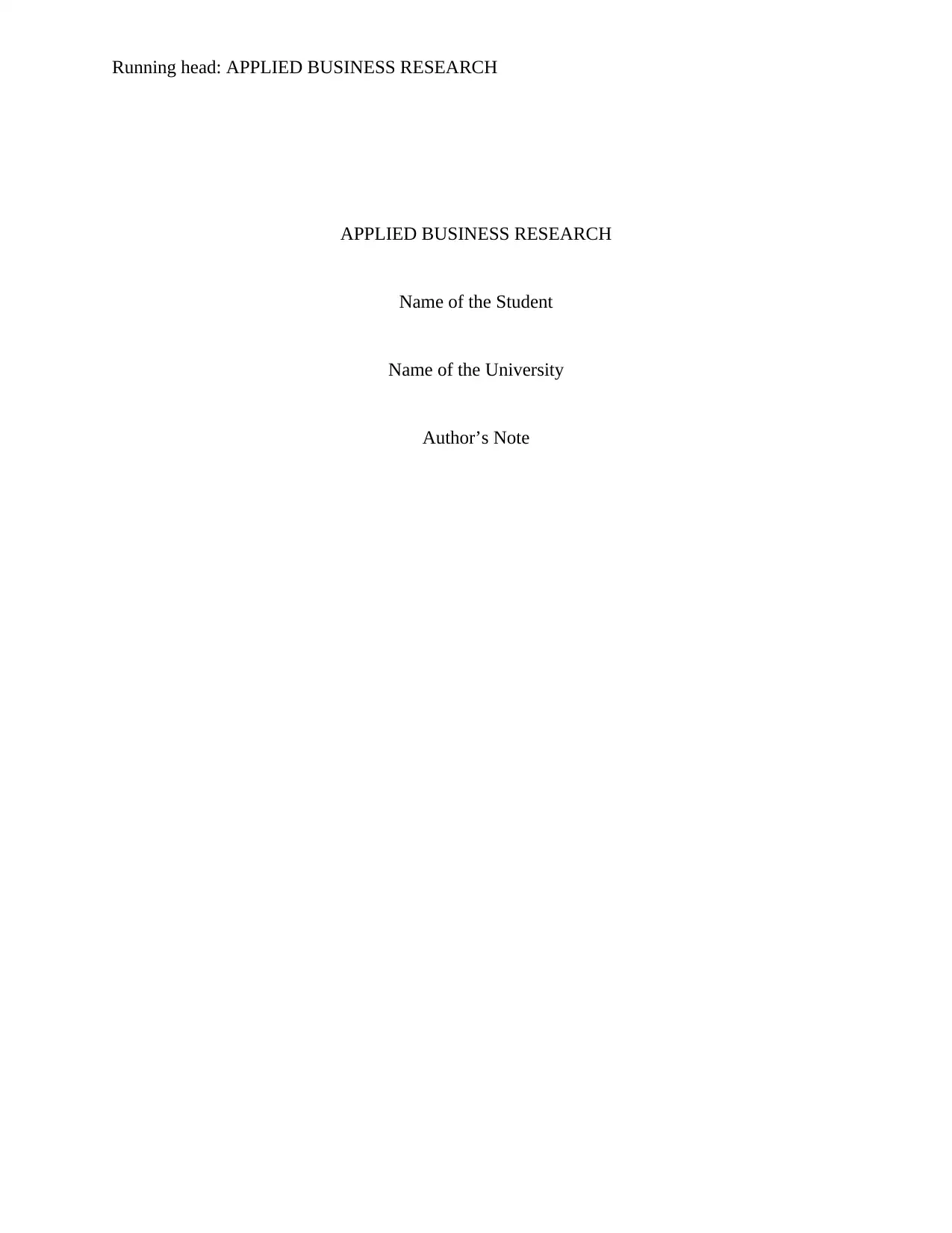
Running head: APPLIED BUSINESS RESEARCH
APPLIED BUSINESS RESEARCH
Name of the Student
Name of the University
Author’s Note
APPLIED BUSINESS RESEARCH
Name of the Student
Name of the University
Author’s Note
Paraphrase This Document
Need a fresh take? Get an instant paraphrase of this document with our AI Paraphraser
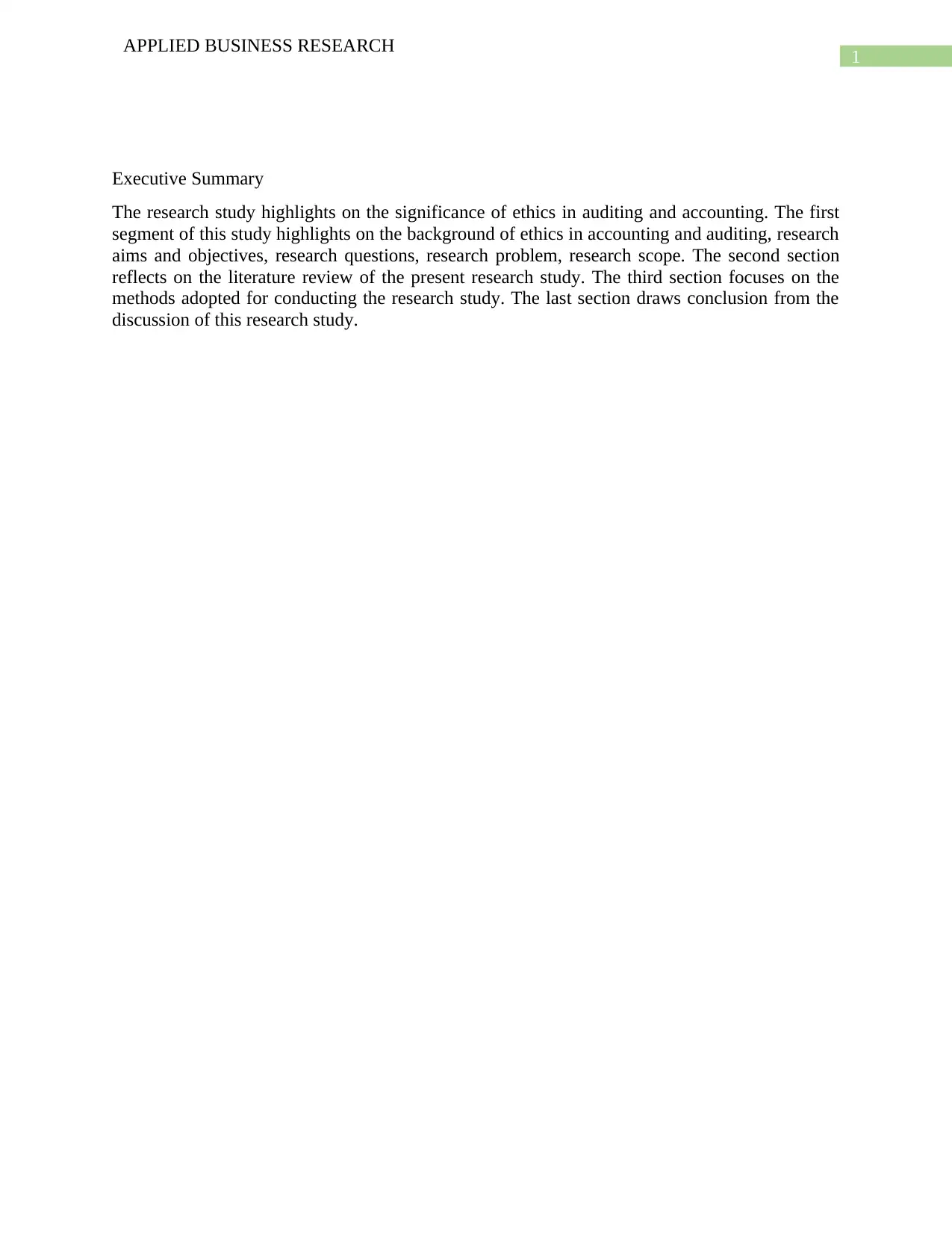
1
APPLIED BUSINESS RESEARCH
Executive Summary
The research study highlights on the significance of ethics in auditing and accounting. The first
segment of this study highlights on the background of ethics in accounting and auditing, research
aims and objectives, research questions, research problem, research scope. The second section
reflects on the literature review of the present research study. The third section focuses on the
methods adopted for conducting the research study. The last section draws conclusion from the
discussion of this research study.
APPLIED BUSINESS RESEARCH
Executive Summary
The research study highlights on the significance of ethics in auditing and accounting. The first
segment of this study highlights on the background of ethics in accounting and auditing, research
aims and objectives, research questions, research problem, research scope. The second section
reflects on the literature review of the present research study. The third section focuses on the
methods adopted for conducting the research study. The last section draws conclusion from the
discussion of this research study.
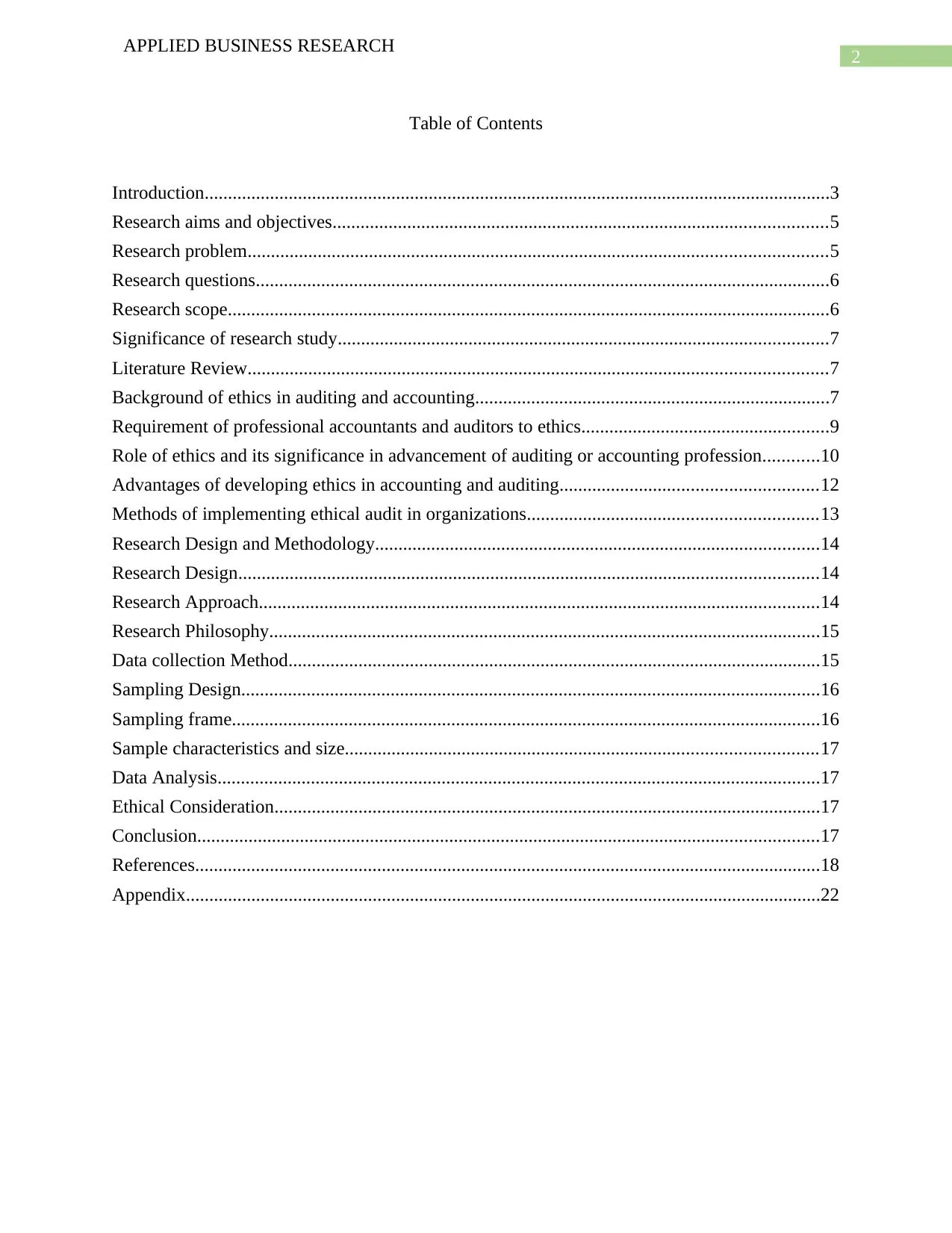
2
APPLIED BUSINESS RESEARCH
Table of Contents
Introduction......................................................................................................................................3
Research aims and objectives..........................................................................................................5
Research problem............................................................................................................................5
Research questions...........................................................................................................................6
Research scope.................................................................................................................................6
Significance of research study.........................................................................................................7
Literature Review............................................................................................................................7
Background of ethics in auditing and accounting............................................................................7
Requirement of professional accountants and auditors to ethics.....................................................9
Role of ethics and its significance in advancement of auditing or accounting profession............10
Advantages of developing ethics in accounting and auditing.......................................................12
Methods of implementing ethical audit in organizations..............................................................13
Research Design and Methodology...............................................................................................14
Research Design............................................................................................................................14
Research Approach........................................................................................................................14
Research Philosophy......................................................................................................................15
Data collection Method..................................................................................................................15
Sampling Design............................................................................................................................16
Sampling frame..............................................................................................................................16
Sample characteristics and size.....................................................................................................17
Data Analysis.................................................................................................................................17
Ethical Consideration.....................................................................................................................17
Conclusion.....................................................................................................................................17
References......................................................................................................................................18
Appendix........................................................................................................................................22
APPLIED BUSINESS RESEARCH
Table of Contents
Introduction......................................................................................................................................3
Research aims and objectives..........................................................................................................5
Research problem............................................................................................................................5
Research questions...........................................................................................................................6
Research scope.................................................................................................................................6
Significance of research study.........................................................................................................7
Literature Review............................................................................................................................7
Background of ethics in auditing and accounting............................................................................7
Requirement of professional accountants and auditors to ethics.....................................................9
Role of ethics and its significance in advancement of auditing or accounting profession............10
Advantages of developing ethics in accounting and auditing.......................................................12
Methods of implementing ethical audit in organizations..............................................................13
Research Design and Methodology...............................................................................................14
Research Design............................................................................................................................14
Research Approach........................................................................................................................14
Research Philosophy......................................................................................................................15
Data collection Method..................................................................................................................15
Sampling Design............................................................................................................................16
Sampling frame..............................................................................................................................16
Sample characteristics and size.....................................................................................................17
Data Analysis.................................................................................................................................17
Ethical Consideration.....................................................................................................................17
Conclusion.....................................................................................................................................17
References......................................................................................................................................18
Appendix........................................................................................................................................22
⊘ This is a preview!⊘
Do you want full access?
Subscribe today to unlock all pages.

Trusted by 1+ million students worldwide
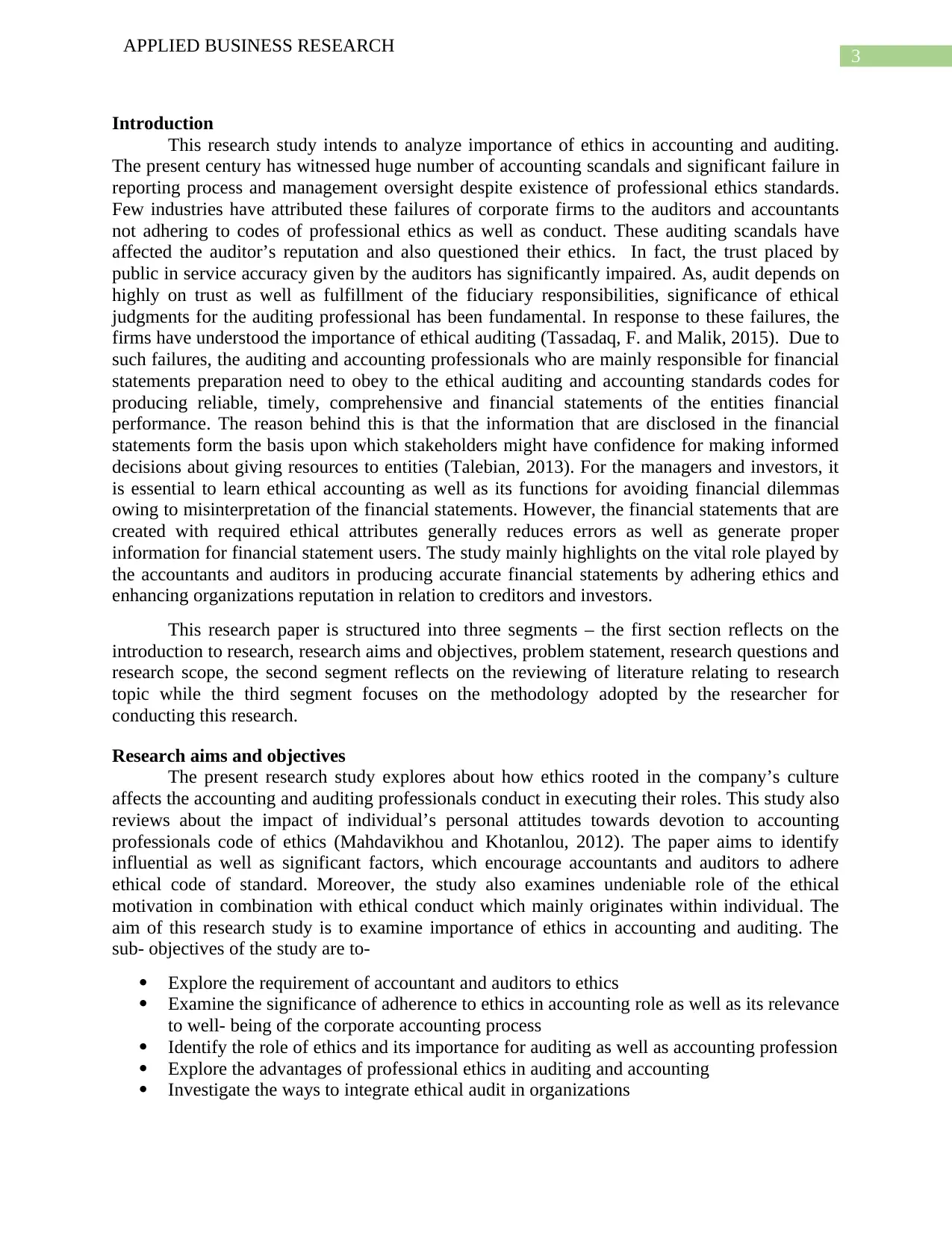
3
APPLIED BUSINESS RESEARCH
Introduction
This research study intends to analyze importance of ethics in accounting and auditing.
The present century has witnessed huge number of accounting scandals and significant failure in
reporting process and management oversight despite existence of professional ethics standards.
Few industries have attributed these failures of corporate firms to the auditors and accountants
not adhering to codes of professional ethics as well as conduct. These auditing scandals have
affected the auditor’s reputation and also questioned their ethics. In fact, the trust placed by
public in service accuracy given by the auditors has significantly impaired. As, audit depends on
highly on trust as well as fulfillment of the fiduciary responsibilities, significance of ethical
judgments for the auditing professional has been fundamental. In response to these failures, the
firms have understood the importance of ethical auditing (Tassadaq, F. and Malik, 2015). Due to
such failures, the auditing and accounting professionals who are mainly responsible for financial
statements preparation need to obey to the ethical auditing and accounting standards codes for
producing reliable, timely, comprehensive and financial statements of the entities financial
performance. The reason behind this is that the information that are disclosed in the financial
statements form the basis upon which stakeholders might have confidence for making informed
decisions about giving resources to entities (Talebian, 2013). For the managers and investors, it
is essential to learn ethical accounting as well as its functions for avoiding financial dilemmas
owing to misinterpretation of the financial statements. However, the financial statements that are
created with required ethical attributes generally reduces errors as well as generate proper
information for financial statement users. The study mainly highlights on the vital role played by
the accountants and auditors in producing accurate financial statements by adhering ethics and
enhancing organizations reputation in relation to creditors and investors.
This research paper is structured into three segments – the first section reflects on the
introduction to research, research aims and objectives, problem statement, research questions and
research scope, the second segment reflects on the reviewing of literature relating to research
topic while the third segment focuses on the methodology adopted by the researcher for
conducting this research.
Research aims and objectives
The present research study explores about how ethics rooted in the company’s culture
affects the accounting and auditing professionals conduct in executing their roles. This study also
reviews about the impact of individual’s personal attitudes towards devotion to accounting
professionals code of ethics (Mahdavikhou and Khotanlou, 2012). The paper aims to identify
influential as well as significant factors, which encourage accountants and auditors to adhere
ethical code of standard. Moreover, the study also examines undeniable role of the ethical
motivation in combination with ethical conduct which mainly originates within individual. The
aim of this research study is to examine importance of ethics in accounting and auditing. The
sub- objectives of the study are to-
Explore the requirement of accountant and auditors to ethics
Examine the significance of adherence to ethics in accounting role as well as its relevance
to well- being of the corporate accounting process
Identify the role of ethics and its importance for auditing as well as accounting profession
Explore the advantages of professional ethics in auditing and accounting
Investigate the ways to integrate ethical audit in organizations
APPLIED BUSINESS RESEARCH
Introduction
This research study intends to analyze importance of ethics in accounting and auditing.
The present century has witnessed huge number of accounting scandals and significant failure in
reporting process and management oversight despite existence of professional ethics standards.
Few industries have attributed these failures of corporate firms to the auditors and accountants
not adhering to codes of professional ethics as well as conduct. These auditing scandals have
affected the auditor’s reputation and also questioned their ethics. In fact, the trust placed by
public in service accuracy given by the auditors has significantly impaired. As, audit depends on
highly on trust as well as fulfillment of the fiduciary responsibilities, significance of ethical
judgments for the auditing professional has been fundamental. In response to these failures, the
firms have understood the importance of ethical auditing (Tassadaq, F. and Malik, 2015). Due to
such failures, the auditing and accounting professionals who are mainly responsible for financial
statements preparation need to obey to the ethical auditing and accounting standards codes for
producing reliable, timely, comprehensive and financial statements of the entities financial
performance. The reason behind this is that the information that are disclosed in the financial
statements form the basis upon which stakeholders might have confidence for making informed
decisions about giving resources to entities (Talebian, 2013). For the managers and investors, it
is essential to learn ethical accounting as well as its functions for avoiding financial dilemmas
owing to misinterpretation of the financial statements. However, the financial statements that are
created with required ethical attributes generally reduces errors as well as generate proper
information for financial statement users. The study mainly highlights on the vital role played by
the accountants and auditors in producing accurate financial statements by adhering ethics and
enhancing organizations reputation in relation to creditors and investors.
This research paper is structured into three segments – the first section reflects on the
introduction to research, research aims and objectives, problem statement, research questions and
research scope, the second segment reflects on the reviewing of literature relating to research
topic while the third segment focuses on the methodology adopted by the researcher for
conducting this research.
Research aims and objectives
The present research study explores about how ethics rooted in the company’s culture
affects the accounting and auditing professionals conduct in executing their roles. This study also
reviews about the impact of individual’s personal attitudes towards devotion to accounting
professionals code of ethics (Mahdavikhou and Khotanlou, 2012). The paper aims to identify
influential as well as significant factors, which encourage accountants and auditors to adhere
ethical code of standard. Moreover, the study also examines undeniable role of the ethical
motivation in combination with ethical conduct which mainly originates within individual. The
aim of this research study is to examine importance of ethics in accounting and auditing. The
sub- objectives of the study are to-
Explore the requirement of accountant and auditors to ethics
Examine the significance of adherence to ethics in accounting role as well as its relevance
to well- being of the corporate accounting process
Identify the role of ethics and its importance for auditing as well as accounting profession
Explore the advantages of professional ethics in auditing and accounting
Investigate the ways to integrate ethical audit in organizations
Paraphrase This Document
Need a fresh take? Get an instant paraphrase of this document with our AI Paraphraser
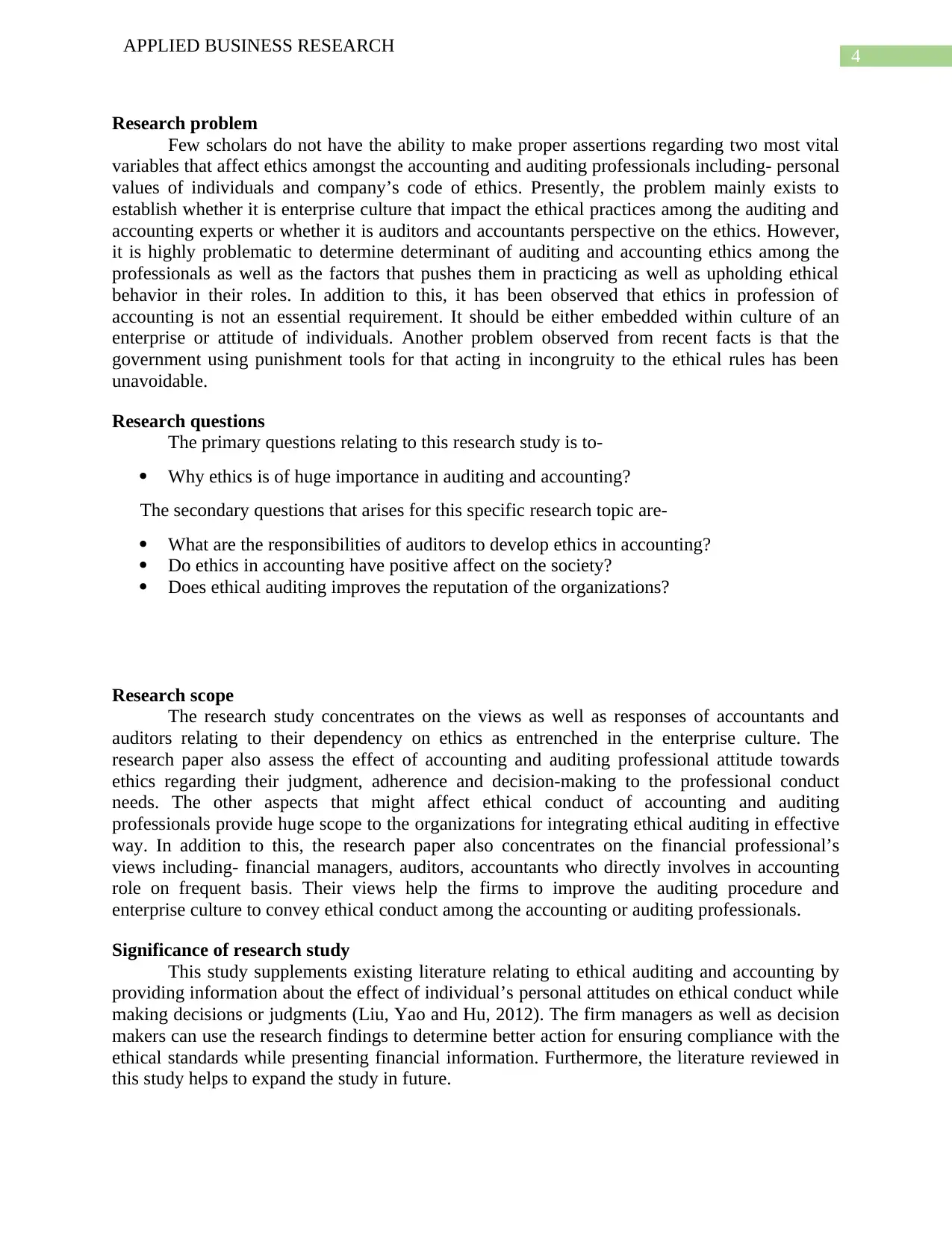
4
APPLIED BUSINESS RESEARCH
Research problem
Few scholars do not have the ability to make proper assertions regarding two most vital
variables that affect ethics amongst the accounting and auditing professionals including- personal
values of individuals and company’s code of ethics. Presently, the problem mainly exists to
establish whether it is enterprise culture that impact the ethical practices among the auditing and
accounting experts or whether it is auditors and accountants perspective on the ethics. However,
it is highly problematic to determine determinant of auditing and accounting ethics among the
professionals as well as the factors that pushes them in practicing as well as upholding ethical
behavior in their roles. In addition to this, it has been observed that ethics in profession of
accounting is not an essential requirement. It should be either embedded within culture of an
enterprise or attitude of individuals. Another problem observed from recent facts is that the
government using punishment tools for that acting in incongruity to the ethical rules has been
unavoidable.
Research questions
The primary questions relating to this research study is to-
Why ethics is of huge importance in auditing and accounting?
The secondary questions that arises for this specific research topic are-
What are the responsibilities of auditors to develop ethics in accounting?
Do ethics in accounting have positive affect on the society?
Does ethical auditing improves the reputation of the organizations?
Research scope
The research study concentrates on the views as well as responses of accountants and
auditors relating to their dependency on ethics as entrenched in the enterprise culture. The
research paper also assess the effect of accounting and auditing professional attitude towards
ethics regarding their judgment, adherence and decision-making to the professional conduct
needs. The other aspects that might affect ethical conduct of accounting and auditing
professionals provide huge scope to the organizations for integrating ethical auditing in effective
way. In addition to this, the research paper also concentrates on the financial professional’s
views including- financial managers, auditors, accountants who directly involves in accounting
role on frequent basis. Their views help the firms to improve the auditing procedure and
enterprise culture to convey ethical conduct among the accounting or auditing professionals.
Significance of research study
This study supplements existing literature relating to ethical auditing and accounting by
providing information about the effect of individual’s personal attitudes on ethical conduct while
making decisions or judgments (Liu, Yao and Hu, 2012). The firm managers as well as decision
makers can use the research findings to determine better action for ensuring compliance with the
ethical standards while presenting financial information. Furthermore, the literature reviewed in
this study helps to expand the study in future.
APPLIED BUSINESS RESEARCH
Research problem
Few scholars do not have the ability to make proper assertions regarding two most vital
variables that affect ethics amongst the accounting and auditing professionals including- personal
values of individuals and company’s code of ethics. Presently, the problem mainly exists to
establish whether it is enterprise culture that impact the ethical practices among the auditing and
accounting experts or whether it is auditors and accountants perspective on the ethics. However,
it is highly problematic to determine determinant of auditing and accounting ethics among the
professionals as well as the factors that pushes them in practicing as well as upholding ethical
behavior in their roles. In addition to this, it has been observed that ethics in profession of
accounting is not an essential requirement. It should be either embedded within culture of an
enterprise or attitude of individuals. Another problem observed from recent facts is that the
government using punishment tools for that acting in incongruity to the ethical rules has been
unavoidable.
Research questions
The primary questions relating to this research study is to-
Why ethics is of huge importance in auditing and accounting?
The secondary questions that arises for this specific research topic are-
What are the responsibilities of auditors to develop ethics in accounting?
Do ethics in accounting have positive affect on the society?
Does ethical auditing improves the reputation of the organizations?
Research scope
The research study concentrates on the views as well as responses of accountants and
auditors relating to their dependency on ethics as entrenched in the enterprise culture. The
research paper also assess the effect of accounting and auditing professional attitude towards
ethics regarding their judgment, adherence and decision-making to the professional conduct
needs. The other aspects that might affect ethical conduct of accounting and auditing
professionals provide huge scope to the organizations for integrating ethical auditing in effective
way. In addition to this, the research paper also concentrates on the financial professional’s
views including- financial managers, auditors, accountants who directly involves in accounting
role on frequent basis. Their views help the firms to improve the auditing procedure and
enterprise culture to convey ethical conduct among the accounting or auditing professionals.
Significance of research study
This study supplements existing literature relating to ethical auditing and accounting by
providing information about the effect of individual’s personal attitudes on ethical conduct while
making decisions or judgments (Liu, Yao and Hu, 2012). The firm managers as well as decision
makers can use the research findings to determine better action for ensuring compliance with the
ethical standards while presenting financial information. Furthermore, the literature reviewed in
this study helps to expand the study in future.
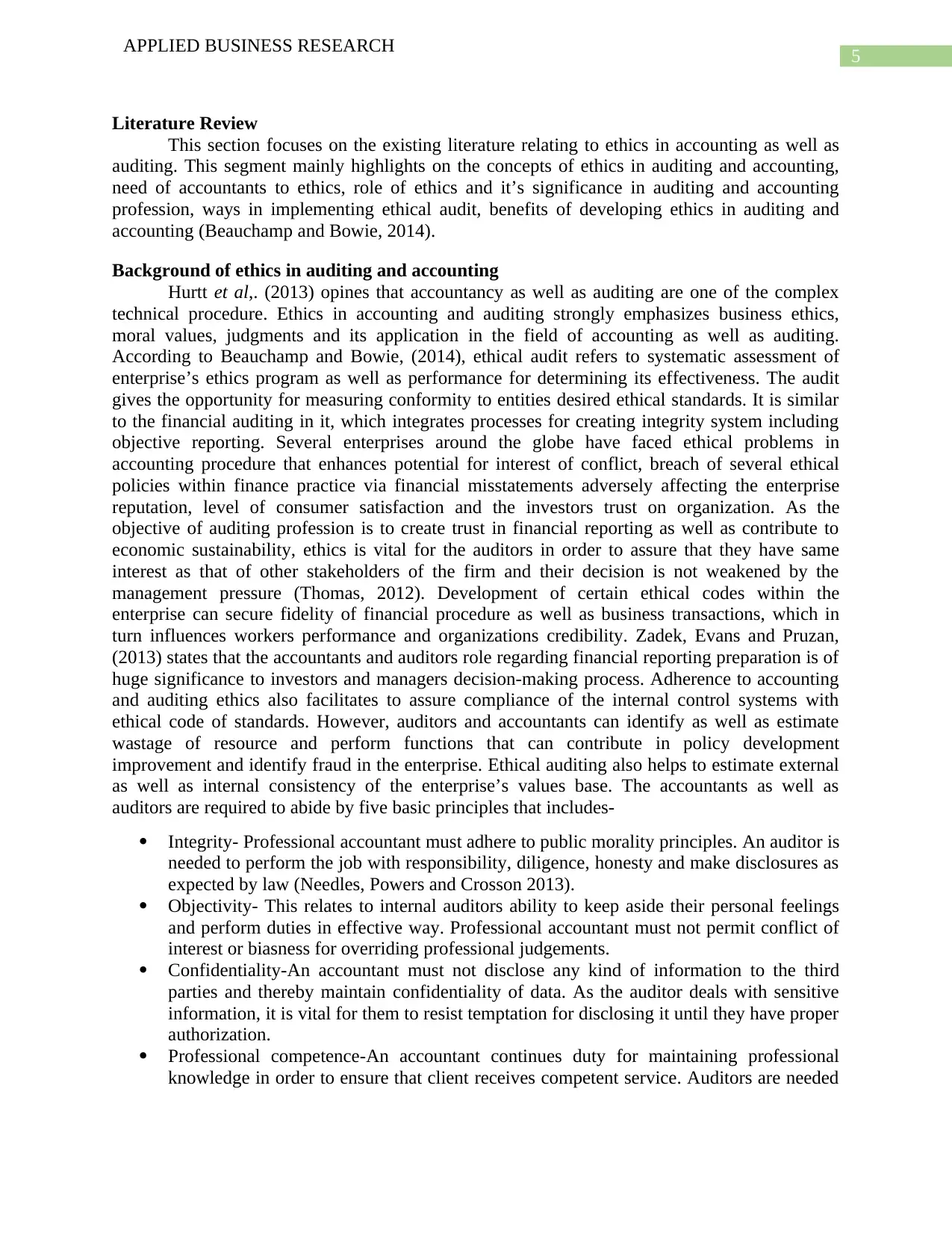
5
APPLIED BUSINESS RESEARCH
Literature Review
This section focuses on the existing literature relating to ethics in accounting as well as
auditing. This segment mainly highlights on the concepts of ethics in auditing and accounting,
need of accountants to ethics, role of ethics and it’s significance in auditing and accounting
profession, ways in implementing ethical audit, benefits of developing ethics in auditing and
accounting (Beauchamp and Bowie, 2014).
Background of ethics in auditing and accounting
Hurtt et al,. (2013) opines that accountancy as well as auditing are one of the complex
technical procedure. Ethics in accounting and auditing strongly emphasizes business ethics,
moral values, judgments and its application in the field of accounting as well as auditing.
According to Beauchamp and Bowie, (2014), ethical audit refers to systematic assessment of
enterprise’s ethics program as well as performance for determining its effectiveness. The audit
gives the opportunity for measuring conformity to entities desired ethical standards. It is similar
to the financial auditing in it, which integrates processes for creating integrity system including
objective reporting. Several enterprises around the globe have faced ethical problems in
accounting procedure that enhances potential for interest of conflict, breach of several ethical
policies within finance practice via financial misstatements adversely affecting the enterprise
reputation, level of consumer satisfaction and the investors trust on organization. As the
objective of auditing profession is to create trust in financial reporting as well as contribute to
economic sustainability, ethics is vital for the auditors in order to assure that they have same
interest as that of other stakeholders of the firm and their decision is not weakened by the
management pressure (Thomas, 2012). Development of certain ethical codes within the
enterprise can secure fidelity of financial procedure as well as business transactions, which in
turn influences workers performance and organizations credibility. Zadek, Evans and Pruzan,
(2013) states that the accountants and auditors role regarding financial reporting preparation is of
huge significance to investors and managers decision-making process. Adherence to accounting
and auditing ethics also facilitates to assure compliance of the internal control systems with
ethical code of standards. However, auditors and accountants can identify as well as estimate
wastage of resource and perform functions that can contribute in policy development
improvement and identify fraud in the enterprise. Ethical auditing also helps to estimate external
as well as internal consistency of the enterprise’s values base. The accountants as well as
auditors are required to abide by five basic principles that includes-
Integrity- Professional accountant must adhere to public morality principles. An auditor is
needed to perform the job with responsibility, diligence, honesty and make disclosures as
expected by law (Needles, Powers and Crosson 2013).
Objectivity- This relates to internal auditors ability to keep aside their personal feelings
and perform duties in effective way. Professional accountant must not permit conflict of
interest or biasness for overriding professional judgements.
Confidentiality-An accountant must not disclose any kind of information to the third
parties and thereby maintain confidentiality of data. As the auditor deals with sensitive
information, it is vital for them to resist temptation for disclosing it until they have proper
authorization.
Professional competence-An accountant continues duty for maintaining professional
knowledge in order to ensure that client receives competent service. Auditors are needed
APPLIED BUSINESS RESEARCH
Literature Review
This section focuses on the existing literature relating to ethics in accounting as well as
auditing. This segment mainly highlights on the concepts of ethics in auditing and accounting,
need of accountants to ethics, role of ethics and it’s significance in auditing and accounting
profession, ways in implementing ethical audit, benefits of developing ethics in auditing and
accounting (Beauchamp and Bowie, 2014).
Background of ethics in auditing and accounting
Hurtt et al,. (2013) opines that accountancy as well as auditing are one of the complex
technical procedure. Ethics in accounting and auditing strongly emphasizes business ethics,
moral values, judgments and its application in the field of accounting as well as auditing.
According to Beauchamp and Bowie, (2014), ethical audit refers to systematic assessment of
enterprise’s ethics program as well as performance for determining its effectiveness. The audit
gives the opportunity for measuring conformity to entities desired ethical standards. It is similar
to the financial auditing in it, which integrates processes for creating integrity system including
objective reporting. Several enterprises around the globe have faced ethical problems in
accounting procedure that enhances potential for interest of conflict, breach of several ethical
policies within finance practice via financial misstatements adversely affecting the enterprise
reputation, level of consumer satisfaction and the investors trust on organization. As the
objective of auditing profession is to create trust in financial reporting as well as contribute to
economic sustainability, ethics is vital for the auditors in order to assure that they have same
interest as that of other stakeholders of the firm and their decision is not weakened by the
management pressure (Thomas, 2012). Development of certain ethical codes within the
enterprise can secure fidelity of financial procedure as well as business transactions, which in
turn influences workers performance and organizations credibility. Zadek, Evans and Pruzan,
(2013) states that the accountants and auditors role regarding financial reporting preparation is of
huge significance to investors and managers decision-making process. Adherence to accounting
and auditing ethics also facilitates to assure compliance of the internal control systems with
ethical code of standards. However, auditors and accountants can identify as well as estimate
wastage of resource and perform functions that can contribute in policy development
improvement and identify fraud in the enterprise. Ethical auditing also helps to estimate external
as well as internal consistency of the enterprise’s values base. The accountants as well as
auditors are required to abide by five basic principles that includes-
Integrity- Professional accountant must adhere to public morality principles. An auditor is
needed to perform the job with responsibility, diligence, honesty and make disclosures as
expected by law (Needles, Powers and Crosson 2013).
Objectivity- This relates to internal auditors ability to keep aside their personal feelings
and perform duties in effective way. Professional accountant must not permit conflict of
interest or biasness for overriding professional judgements.
Confidentiality-An accountant must not disclose any kind of information to the third
parties and thereby maintain confidentiality of data. As the auditor deals with sensitive
information, it is vital for them to resist temptation for disclosing it until they have proper
authorization.
Professional competence-An accountant continues duty for maintaining professional
knowledge in order to ensure that client receives competent service. Auditors are needed
⊘ This is a preview!⊘
Do you want full access?
Subscribe today to unlock all pages.

Trusted by 1+ million students worldwide
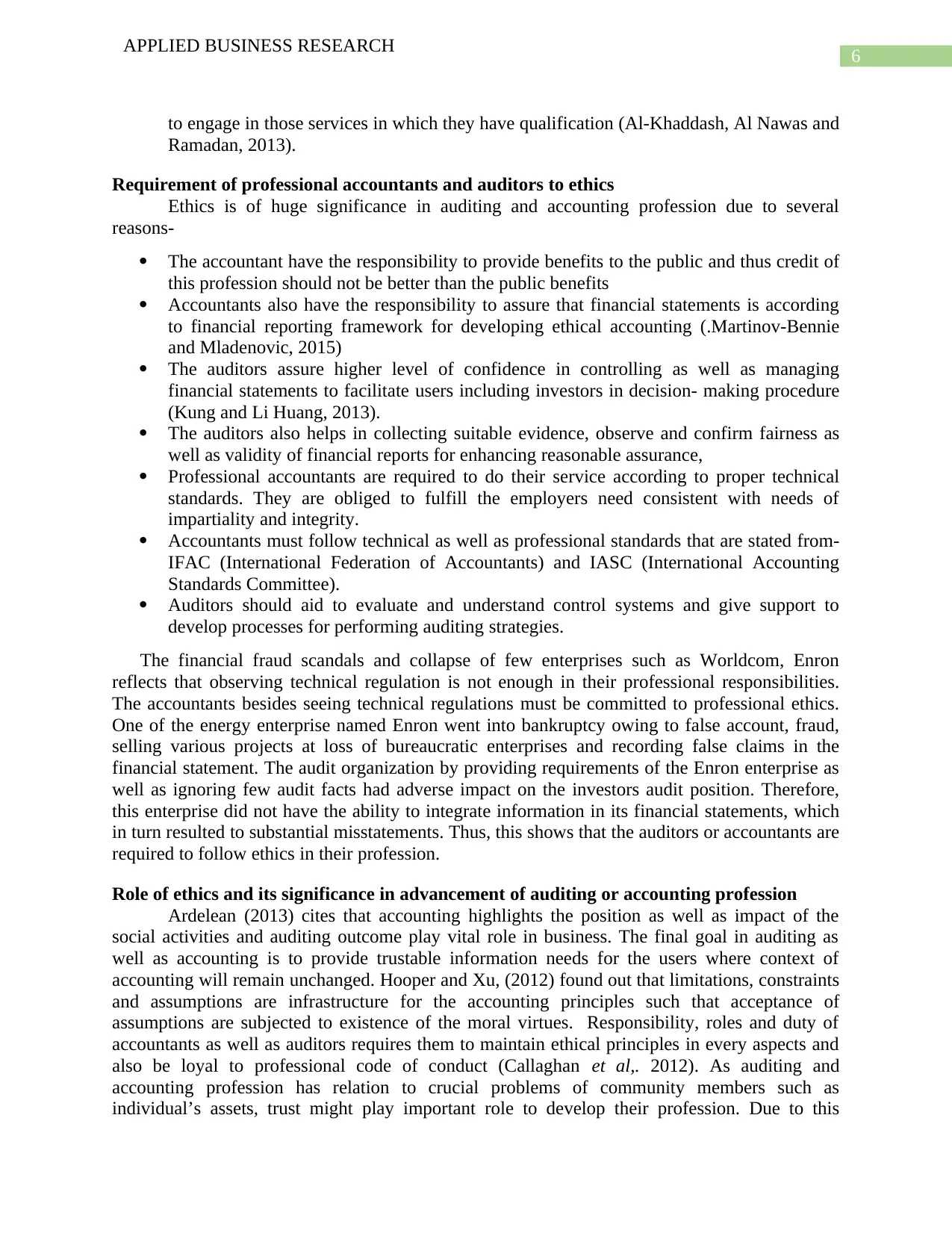
6
APPLIED BUSINESS RESEARCH
to engage in those services in which they have qualification (Al-Khaddash, Al Nawas and
Ramadan, 2013).
Requirement of professional accountants and auditors to ethics
Ethics is of huge significance in auditing and accounting profession due to several
reasons-
The accountant have the responsibility to provide benefits to the public and thus credit of
this profession should not be better than the public benefits
Accountants also have the responsibility to assure that financial statements is according
to financial reporting framework for developing ethical accounting (.Martinov-Bennie
and Mladenovic, 2015)
The auditors assure higher level of confidence in controlling as well as managing
financial statements to facilitate users including investors in decision- making procedure
(Kung and Li Huang, 2013).
The auditors also helps in collecting suitable evidence, observe and confirm fairness as
well as validity of financial reports for enhancing reasonable assurance,
Professional accountants are required to do their service according to proper technical
standards. They are obliged to fulfill the employers need consistent with needs of
impartiality and integrity.
Accountants must follow technical as well as professional standards that are stated from-
IFAC (International Federation of Accountants) and IASC (International Accounting
Standards Committee).
Auditors should aid to evaluate and understand control systems and give support to
develop processes for performing auditing strategies.
The financial fraud scandals and collapse of few enterprises such as Worldcom, Enron
reflects that observing technical regulation is not enough in their professional responsibilities.
The accountants besides seeing technical regulations must be committed to professional ethics.
One of the energy enterprise named Enron went into bankruptcy owing to false account, fraud,
selling various projects at loss of bureaucratic enterprises and recording false claims in the
financial statement. The audit organization by providing requirements of the Enron enterprise as
well as ignoring few audit facts had adverse impact on the investors audit position. Therefore,
this enterprise did not have the ability to integrate information in its financial statements, which
in turn resulted to substantial misstatements. Thus, this shows that the auditors or accountants are
required to follow ethics in their profession.
Role of ethics and its significance in advancement of auditing or accounting profession
Ardelean (2013) cites that accounting highlights the position as well as impact of the
social activities and auditing outcome play vital role in business. The final goal in auditing as
well as accounting is to provide trustable information needs for the users where context of
accounting will remain unchanged. Hooper and Xu, (2012) found out that limitations, constraints
and assumptions are infrastructure for the accounting principles such that acceptance of
assumptions are subjected to existence of the moral virtues. Responsibility, roles and duty of
accountants as well as auditors requires them to maintain ethical principles in every aspects and
also be loyal to professional code of conduct (Callaghan et al,. 2012). As auditing and
accounting profession has relation to crucial problems of community members such as
individual’s assets, trust might play important role to develop their profession. Due to this
APPLIED BUSINESS RESEARCH
to engage in those services in which they have qualification (Al-Khaddash, Al Nawas and
Ramadan, 2013).
Requirement of professional accountants and auditors to ethics
Ethics is of huge significance in auditing and accounting profession due to several
reasons-
The accountant have the responsibility to provide benefits to the public and thus credit of
this profession should not be better than the public benefits
Accountants also have the responsibility to assure that financial statements is according
to financial reporting framework for developing ethical accounting (.Martinov-Bennie
and Mladenovic, 2015)
The auditors assure higher level of confidence in controlling as well as managing
financial statements to facilitate users including investors in decision- making procedure
(Kung and Li Huang, 2013).
The auditors also helps in collecting suitable evidence, observe and confirm fairness as
well as validity of financial reports for enhancing reasonable assurance,
Professional accountants are required to do their service according to proper technical
standards. They are obliged to fulfill the employers need consistent with needs of
impartiality and integrity.
Accountants must follow technical as well as professional standards that are stated from-
IFAC (International Federation of Accountants) and IASC (International Accounting
Standards Committee).
Auditors should aid to evaluate and understand control systems and give support to
develop processes for performing auditing strategies.
The financial fraud scandals and collapse of few enterprises such as Worldcom, Enron
reflects that observing technical regulation is not enough in their professional responsibilities.
The accountants besides seeing technical regulations must be committed to professional ethics.
One of the energy enterprise named Enron went into bankruptcy owing to false account, fraud,
selling various projects at loss of bureaucratic enterprises and recording false claims in the
financial statement. The audit organization by providing requirements of the Enron enterprise as
well as ignoring few audit facts had adverse impact on the investors audit position. Therefore,
this enterprise did not have the ability to integrate information in its financial statements, which
in turn resulted to substantial misstatements. Thus, this shows that the auditors or accountants are
required to follow ethics in their profession.
Role of ethics and its significance in advancement of auditing or accounting profession
Ardelean (2013) cites that accounting highlights the position as well as impact of the
social activities and auditing outcome play vital role in business. The final goal in auditing as
well as accounting is to provide trustable information needs for the users where context of
accounting will remain unchanged. Hooper and Xu, (2012) found out that limitations, constraints
and assumptions are infrastructure for the accounting principles such that acceptance of
assumptions are subjected to existence of the moral virtues. Responsibility, roles and duty of
accountants as well as auditors requires them to maintain ethical principles in every aspects and
also be loyal to professional code of conduct (Callaghan et al,. 2012). As auditing and
accounting profession has relation to crucial problems of community members such as
individual’s assets, trust might play important role to develop their profession. Due to this
Paraphrase This Document
Need a fresh take? Get an instant paraphrase of this document with our AI Paraphraser
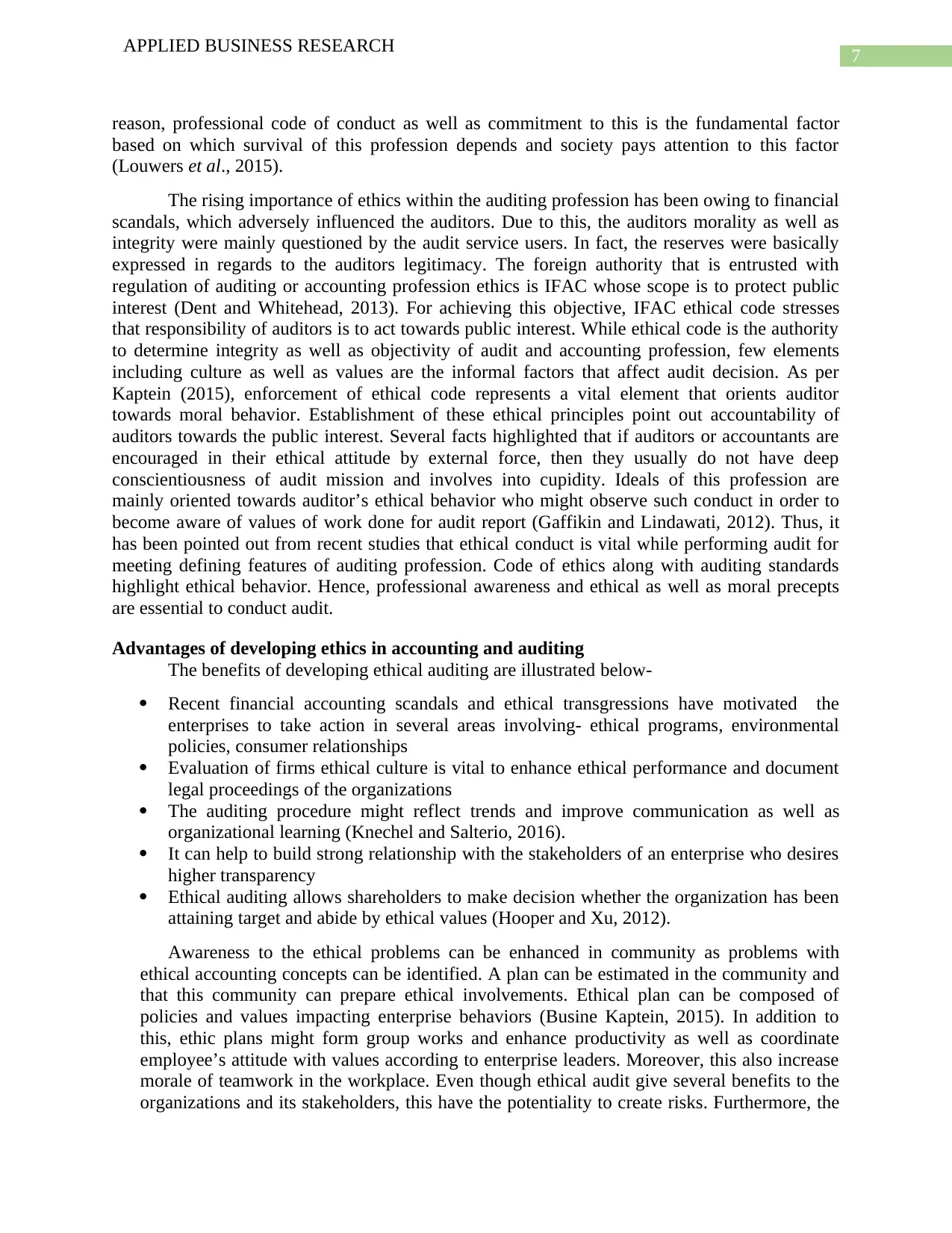
7
APPLIED BUSINESS RESEARCH
reason, professional code of conduct as well as commitment to this is the fundamental factor
based on which survival of this profession depends and society pays attention to this factor
(Louwers et al., 2015).
The rising importance of ethics within the auditing profession has been owing to financial
scandals, which adversely influenced the auditors. Due to this, the auditors morality as well as
integrity were mainly questioned by the audit service users. In fact, the reserves were basically
expressed in regards to the auditors legitimacy. The foreign authority that is entrusted with
regulation of auditing or accounting profession ethics is IFAC whose scope is to protect public
interest (Dent and Whitehead, 2013). For achieving this objective, IFAC ethical code stresses
that responsibility of auditors is to act towards public interest. While ethical code is the authority
to determine integrity as well as objectivity of audit and accounting profession, few elements
including culture as well as values are the informal factors that affect audit decision. As per
Kaptein (2015), enforcement of ethical code represents a vital element that orients auditor
towards moral behavior. Establishment of these ethical principles point out accountability of
auditors towards the public interest. Several facts highlighted that if auditors or accountants are
encouraged in their ethical attitude by external force, then they usually do not have deep
conscientiousness of audit mission and involves into cupidity. Ideals of this profession are
mainly oriented towards auditor’s ethical behavior who might observe such conduct in order to
become aware of values of work done for audit report (Gaffikin and Lindawati, 2012). Thus, it
has been pointed out from recent studies that ethical conduct is vital while performing audit for
meeting defining features of auditing profession. Code of ethics along with auditing standards
highlight ethical behavior. Hence, professional awareness and ethical as well as moral precepts
are essential to conduct audit.
Advantages of developing ethics in accounting and auditing
The benefits of developing ethical auditing are illustrated below-
Recent financial accounting scandals and ethical transgressions have motivated the
enterprises to take action in several areas involving- ethical programs, environmental
policies, consumer relationships
Evaluation of firms ethical culture is vital to enhance ethical performance and document
legal proceedings of the organizations
The auditing procedure might reflect trends and improve communication as well as
organizational learning (Knechel and Salterio, 2016).
It can help to build strong relationship with the stakeholders of an enterprise who desires
higher transparency
Ethical auditing allows shareholders to make decision whether the organization has been
attaining target and abide by ethical values (Hooper and Xu, 2012).
Awareness to the ethical problems can be enhanced in community as problems with
ethical accounting concepts can be identified. A plan can be estimated in the community and
that this community can prepare ethical involvements. Ethical plan can be composed of
policies and values impacting enterprise behaviors (Busine Kaptein, 2015). In addition to
this, ethic plans might form group works and enhance productivity as well as coordinate
employee’s attitude with values according to enterprise leaders. Moreover, this also increase
morale of teamwork in the workplace. Even though ethical audit give several benefits to the
organizations and its stakeholders, this have the potentiality to create risks. Furthermore, the
APPLIED BUSINESS RESEARCH
reason, professional code of conduct as well as commitment to this is the fundamental factor
based on which survival of this profession depends and society pays attention to this factor
(Louwers et al., 2015).
The rising importance of ethics within the auditing profession has been owing to financial
scandals, which adversely influenced the auditors. Due to this, the auditors morality as well as
integrity were mainly questioned by the audit service users. In fact, the reserves were basically
expressed in regards to the auditors legitimacy. The foreign authority that is entrusted with
regulation of auditing or accounting profession ethics is IFAC whose scope is to protect public
interest (Dent and Whitehead, 2013). For achieving this objective, IFAC ethical code stresses
that responsibility of auditors is to act towards public interest. While ethical code is the authority
to determine integrity as well as objectivity of audit and accounting profession, few elements
including culture as well as values are the informal factors that affect audit decision. As per
Kaptein (2015), enforcement of ethical code represents a vital element that orients auditor
towards moral behavior. Establishment of these ethical principles point out accountability of
auditors towards the public interest. Several facts highlighted that if auditors or accountants are
encouraged in their ethical attitude by external force, then they usually do not have deep
conscientiousness of audit mission and involves into cupidity. Ideals of this profession are
mainly oriented towards auditor’s ethical behavior who might observe such conduct in order to
become aware of values of work done for audit report (Gaffikin and Lindawati, 2012). Thus, it
has been pointed out from recent studies that ethical conduct is vital while performing audit for
meeting defining features of auditing profession. Code of ethics along with auditing standards
highlight ethical behavior. Hence, professional awareness and ethical as well as moral precepts
are essential to conduct audit.
Advantages of developing ethics in accounting and auditing
The benefits of developing ethical auditing are illustrated below-
Recent financial accounting scandals and ethical transgressions have motivated the
enterprises to take action in several areas involving- ethical programs, environmental
policies, consumer relationships
Evaluation of firms ethical culture is vital to enhance ethical performance and document
legal proceedings of the organizations
The auditing procedure might reflect trends and improve communication as well as
organizational learning (Knechel and Salterio, 2016).
It can help to build strong relationship with the stakeholders of an enterprise who desires
higher transparency
Ethical auditing allows shareholders to make decision whether the organization has been
attaining target and abide by ethical values (Hooper and Xu, 2012).
Awareness to the ethical problems can be enhanced in community as problems with
ethical accounting concepts can be identified. A plan can be estimated in the community and
that this community can prepare ethical involvements. Ethical plan can be composed of
policies and values impacting enterprise behaviors (Busine Kaptein, 2015). In addition to
this, ethic plans might form group works and enhance productivity as well as coordinate
employee’s attitude with values according to enterprise leaders. Moreover, this also increase
morale of teamwork in the workplace. Even though ethical audit give several benefits to the
organizations and its stakeholders, this have the potentiality to create risks. Furthermore, the
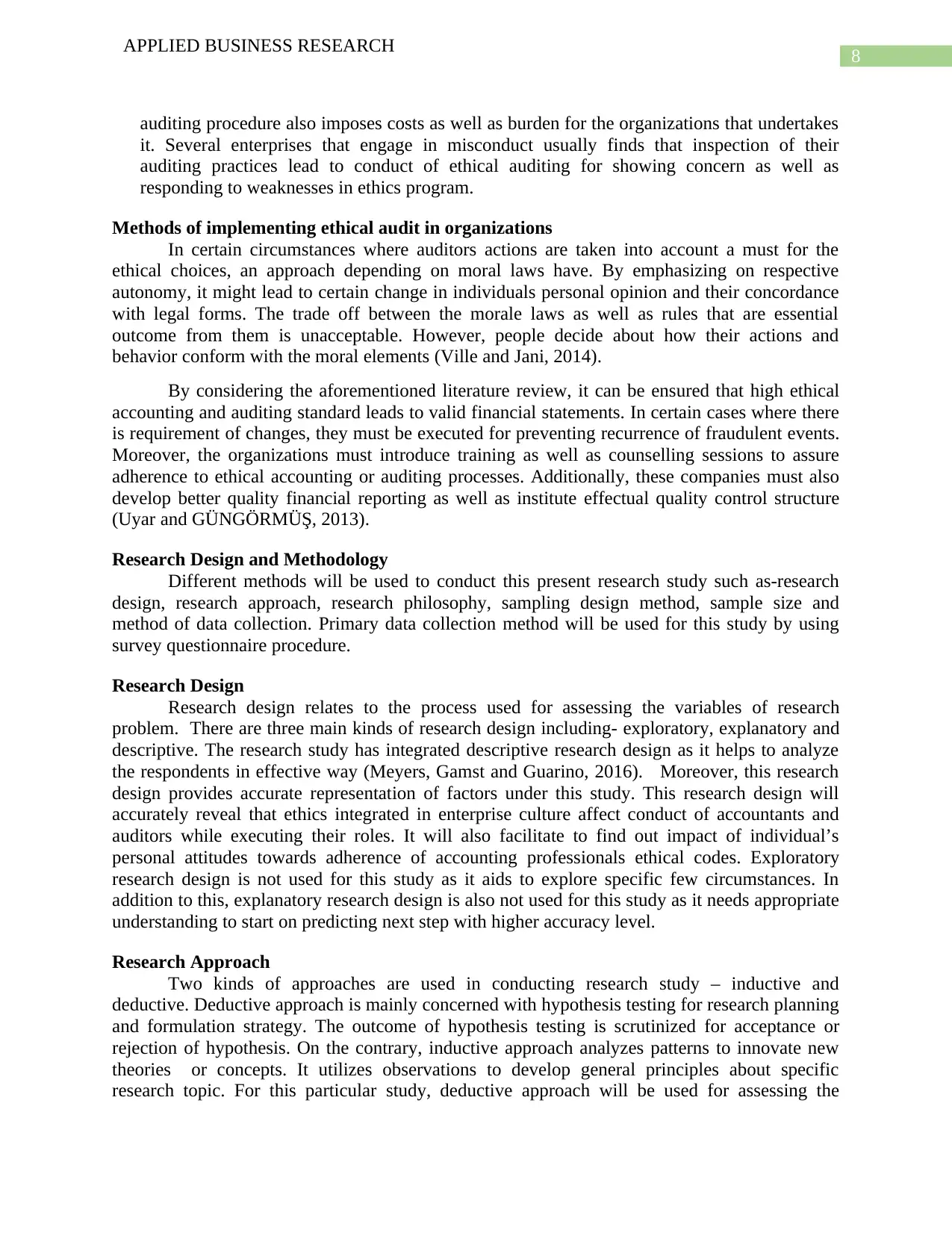
8
APPLIED BUSINESS RESEARCH
auditing procedure also imposes costs as well as burden for the organizations that undertakes
it. Several enterprises that engage in misconduct usually finds that inspection of their
auditing practices lead to conduct of ethical auditing for showing concern as well as
responding to weaknesses in ethics program.
Methods of implementing ethical audit in organizations
In certain circumstances where auditors actions are taken into account a must for the
ethical choices, an approach depending on moral laws have. By emphasizing on respective
autonomy, it might lead to certain change in individuals personal opinion and their concordance
with legal forms. The trade off between the morale laws as well as rules that are essential
outcome from them is unacceptable. However, people decide about how their actions and
behavior conform with the moral elements (Ville and Jani, 2014).
By considering the aforementioned literature review, it can be ensured that high ethical
accounting and auditing standard leads to valid financial statements. In certain cases where there
is requirement of changes, they must be executed for preventing recurrence of fraudulent events.
Moreover, the organizations must introduce training as well as counselling sessions to assure
adherence to ethical accounting or auditing processes. Additionally, these companies must also
develop better quality financial reporting as well as institute effectual quality control structure
(Uyar and GÜNGÖRMÜŞ, 2013).
Research Design and Methodology
Different methods will be used to conduct this present research study such as-research
design, research approach, research philosophy, sampling design method, sample size and
method of data collection. Primary data collection method will be used for this study by using
survey questionnaire procedure.
Research Design
Research design relates to the process used for assessing the variables of research
problem. There are three main kinds of research design including- exploratory, explanatory and
descriptive. The research study has integrated descriptive research design as it helps to analyze
the respondents in effective way (Meyers, Gamst and Guarino, 2016). Moreover, this research
design provides accurate representation of factors under this study. This research design will
accurately reveal that ethics integrated in enterprise culture affect conduct of accountants and
auditors while executing their roles. It will also facilitate to find out impact of individual’s
personal attitudes towards adherence of accounting professionals ethical codes. Exploratory
research design is not used for this study as it aids to explore specific few circumstances. In
addition to this, explanatory research design is also not used for this study as it needs appropriate
understanding to start on predicting next step with higher accuracy level.
Research Approach
Two kinds of approaches are used in conducting research study – inductive and
deductive. Deductive approach is mainly concerned with hypothesis testing for research planning
and formulation strategy. The outcome of hypothesis testing is scrutinized for acceptance or
rejection of hypothesis. On the contrary, inductive approach analyzes patterns to innovate new
theories or concepts. It utilizes observations to develop general principles about specific
research topic. For this particular study, deductive approach will be used for assessing the
APPLIED BUSINESS RESEARCH
auditing procedure also imposes costs as well as burden for the organizations that undertakes
it. Several enterprises that engage in misconduct usually finds that inspection of their
auditing practices lead to conduct of ethical auditing for showing concern as well as
responding to weaknesses in ethics program.
Methods of implementing ethical audit in organizations
In certain circumstances where auditors actions are taken into account a must for the
ethical choices, an approach depending on moral laws have. By emphasizing on respective
autonomy, it might lead to certain change in individuals personal opinion and their concordance
with legal forms. The trade off between the morale laws as well as rules that are essential
outcome from them is unacceptable. However, people decide about how their actions and
behavior conform with the moral elements (Ville and Jani, 2014).
By considering the aforementioned literature review, it can be ensured that high ethical
accounting and auditing standard leads to valid financial statements. In certain cases where there
is requirement of changes, they must be executed for preventing recurrence of fraudulent events.
Moreover, the organizations must introduce training as well as counselling sessions to assure
adherence to ethical accounting or auditing processes. Additionally, these companies must also
develop better quality financial reporting as well as institute effectual quality control structure
(Uyar and GÜNGÖRMÜŞ, 2013).
Research Design and Methodology
Different methods will be used to conduct this present research study such as-research
design, research approach, research philosophy, sampling design method, sample size and
method of data collection. Primary data collection method will be used for this study by using
survey questionnaire procedure.
Research Design
Research design relates to the process used for assessing the variables of research
problem. There are three main kinds of research design including- exploratory, explanatory and
descriptive. The research study has integrated descriptive research design as it helps to analyze
the respondents in effective way (Meyers, Gamst and Guarino, 2016). Moreover, this research
design provides accurate representation of factors under this study. This research design will
accurately reveal that ethics integrated in enterprise culture affect conduct of accountants and
auditors while executing their roles. It will also facilitate to find out impact of individual’s
personal attitudes towards adherence of accounting professionals ethical codes. Exploratory
research design is not used for this study as it aids to explore specific few circumstances. In
addition to this, explanatory research design is also not used for this study as it needs appropriate
understanding to start on predicting next step with higher accuracy level.
Research Approach
Two kinds of approaches are used in conducting research study – inductive and
deductive. Deductive approach is mainly concerned with hypothesis testing for research planning
and formulation strategy. The outcome of hypothesis testing is scrutinized for acceptance or
rejection of hypothesis. On the contrary, inductive approach analyzes patterns to innovate new
theories or concepts. It utilizes observations to develop general principles about specific
research topic. For this particular study, deductive approach will be used for assessing the
⊘ This is a preview!⊘
Do you want full access?
Subscribe today to unlock all pages.

Trusted by 1+ million students worldwide
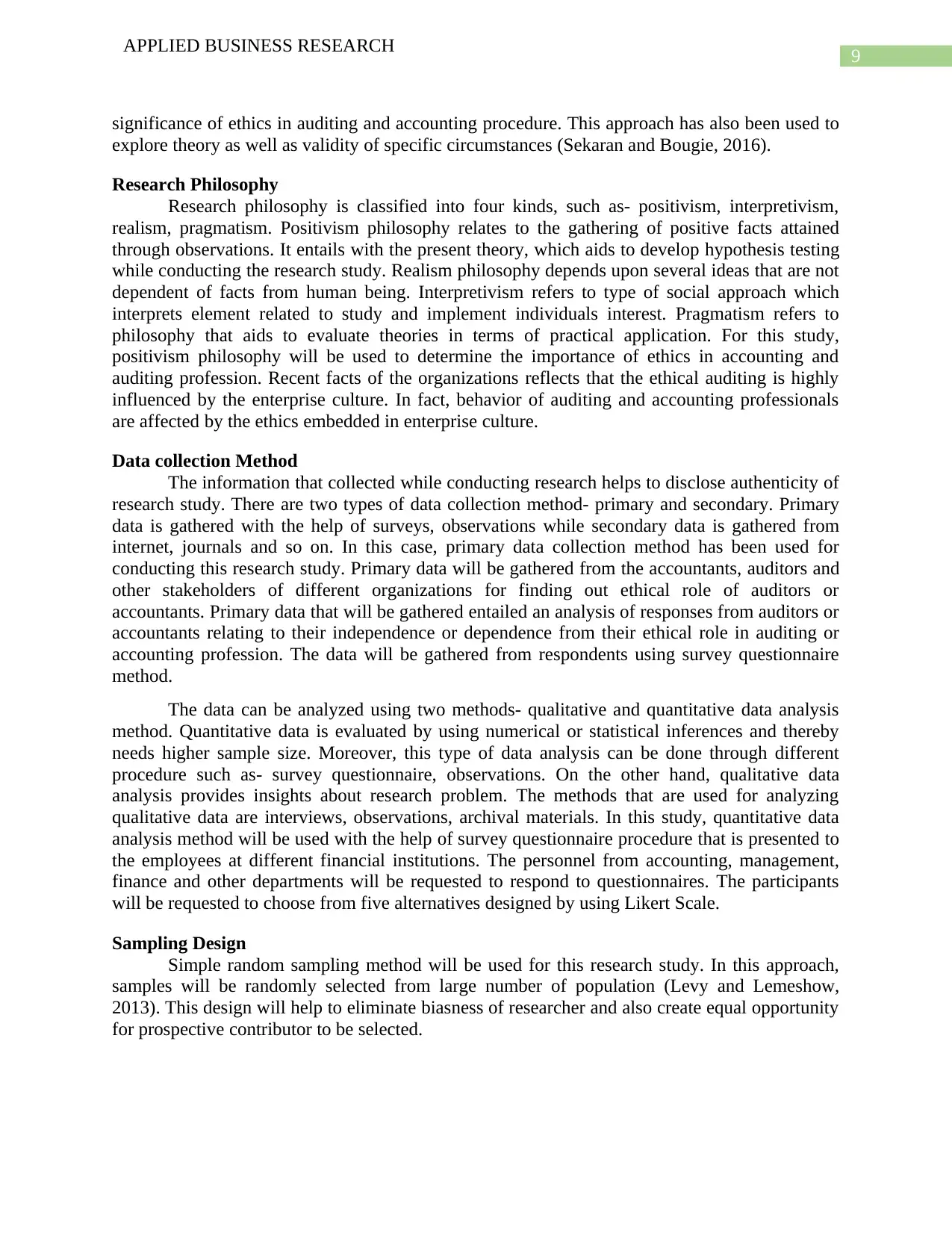
9
APPLIED BUSINESS RESEARCH
significance of ethics in auditing and accounting procedure. This approach has also been used to
explore theory as well as validity of specific circumstances (Sekaran and Bougie, 2016).
Research Philosophy
Research philosophy is classified into four kinds, such as- positivism, interpretivism,
realism, pragmatism. Positivism philosophy relates to the gathering of positive facts attained
through observations. It entails with the present theory, which aids to develop hypothesis testing
while conducting the research study. Realism philosophy depends upon several ideas that are not
dependent of facts from human being. Interpretivism refers to type of social approach which
interprets element related to study and implement individuals interest. Pragmatism refers to
philosophy that aids to evaluate theories in terms of practical application. For this study,
positivism philosophy will be used to determine the importance of ethics in accounting and
auditing profession. Recent facts of the organizations reflects that the ethical auditing is highly
influenced by the enterprise culture. In fact, behavior of auditing and accounting professionals
are affected by the ethics embedded in enterprise culture.
Data collection Method
The information that collected while conducting research helps to disclose authenticity of
research study. There are two types of data collection method- primary and secondary. Primary
data is gathered with the help of surveys, observations while secondary data is gathered from
internet, journals and so on. In this case, primary data collection method has been used for
conducting this research study. Primary data will be gathered from the accountants, auditors and
other stakeholders of different organizations for finding out ethical role of auditors or
accountants. Primary data that will be gathered entailed an analysis of responses from auditors or
accountants relating to their independence or dependence from their ethical role in auditing or
accounting profession. The data will be gathered from respondents using survey questionnaire
method.
The data can be analyzed using two methods- qualitative and quantitative data analysis
method. Quantitative data is evaluated by using numerical or statistical inferences and thereby
needs higher sample size. Moreover, this type of data analysis can be done through different
procedure such as- survey questionnaire, observations. On the other hand, qualitative data
analysis provides insights about research problem. The methods that are used for analyzing
qualitative data are interviews, observations, archival materials. In this study, quantitative data
analysis method will be used with the help of survey questionnaire procedure that is presented to
the employees at different financial institutions. The personnel from accounting, management,
finance and other departments will be requested to respond to questionnaires. The participants
will be requested to choose from five alternatives designed by using Likert Scale.
Sampling Design
Simple random sampling method will be used for this research study. In this approach,
samples will be randomly selected from large number of population (Levy and Lemeshow,
2013). This design will help to eliminate biasness of researcher and also create equal opportunity
for prospective contributor to be selected.
APPLIED BUSINESS RESEARCH
significance of ethics in auditing and accounting procedure. This approach has also been used to
explore theory as well as validity of specific circumstances (Sekaran and Bougie, 2016).
Research Philosophy
Research philosophy is classified into four kinds, such as- positivism, interpretivism,
realism, pragmatism. Positivism philosophy relates to the gathering of positive facts attained
through observations. It entails with the present theory, which aids to develop hypothesis testing
while conducting the research study. Realism philosophy depends upon several ideas that are not
dependent of facts from human being. Interpretivism refers to type of social approach which
interprets element related to study and implement individuals interest. Pragmatism refers to
philosophy that aids to evaluate theories in terms of practical application. For this study,
positivism philosophy will be used to determine the importance of ethics in accounting and
auditing profession. Recent facts of the organizations reflects that the ethical auditing is highly
influenced by the enterprise culture. In fact, behavior of auditing and accounting professionals
are affected by the ethics embedded in enterprise culture.
Data collection Method
The information that collected while conducting research helps to disclose authenticity of
research study. There are two types of data collection method- primary and secondary. Primary
data is gathered with the help of surveys, observations while secondary data is gathered from
internet, journals and so on. In this case, primary data collection method has been used for
conducting this research study. Primary data will be gathered from the accountants, auditors and
other stakeholders of different organizations for finding out ethical role of auditors or
accountants. Primary data that will be gathered entailed an analysis of responses from auditors or
accountants relating to their independence or dependence from their ethical role in auditing or
accounting profession. The data will be gathered from respondents using survey questionnaire
method.
The data can be analyzed using two methods- qualitative and quantitative data analysis
method. Quantitative data is evaluated by using numerical or statistical inferences and thereby
needs higher sample size. Moreover, this type of data analysis can be done through different
procedure such as- survey questionnaire, observations. On the other hand, qualitative data
analysis provides insights about research problem. The methods that are used for analyzing
qualitative data are interviews, observations, archival materials. In this study, quantitative data
analysis method will be used with the help of survey questionnaire procedure that is presented to
the employees at different financial institutions. The personnel from accounting, management,
finance and other departments will be requested to respond to questionnaires. The participants
will be requested to choose from five alternatives designed by using Likert Scale.
Sampling Design
Simple random sampling method will be used for this research study. In this approach,
samples will be randomly selected from large number of population (Levy and Lemeshow,
2013). This design will help to eliminate biasness of researcher and also create equal opportunity
for prospective contributor to be selected.
Paraphrase This Document
Need a fresh take? Get an instant paraphrase of this document with our AI Paraphraser
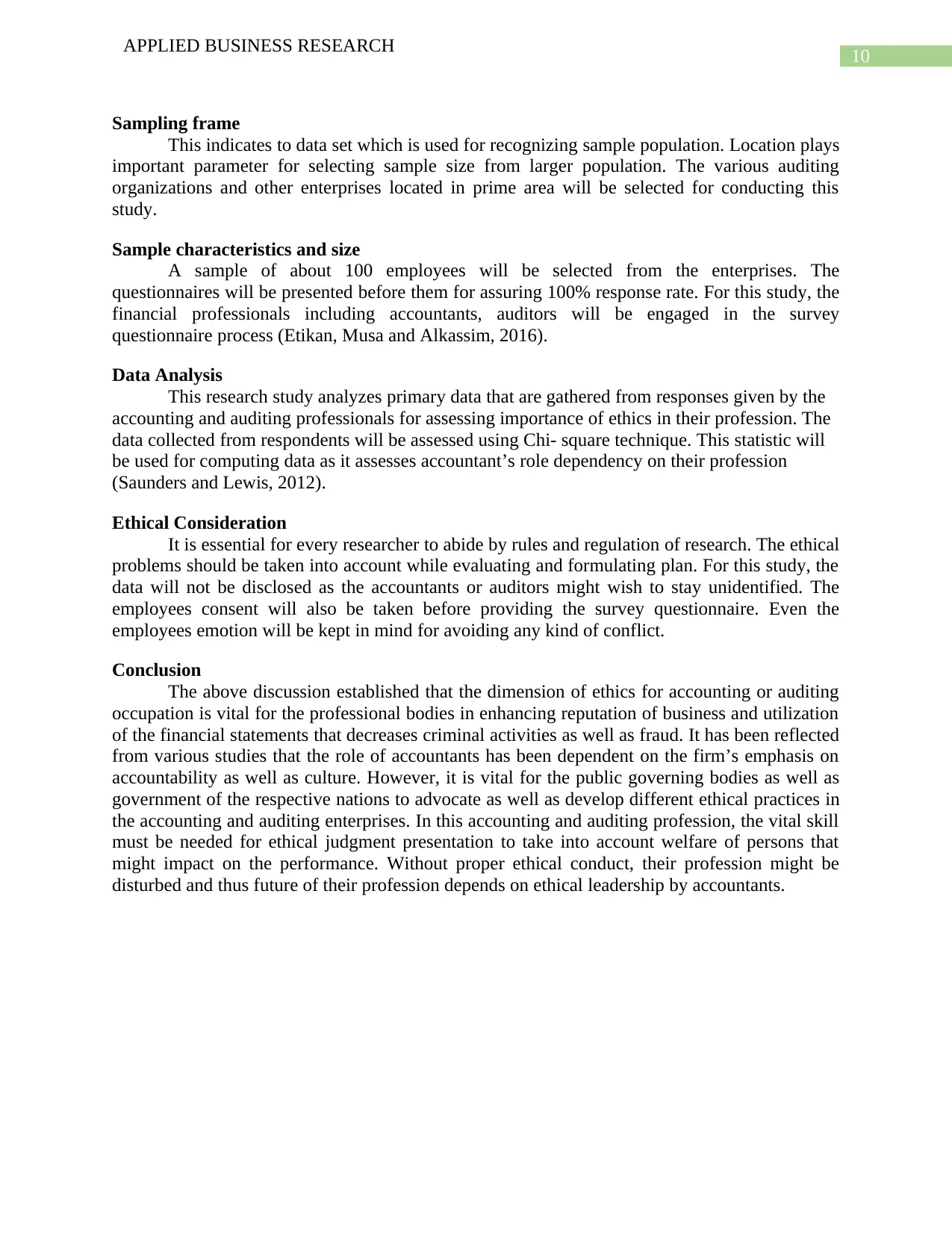
10
APPLIED BUSINESS RESEARCH
Sampling frame
This indicates to data set which is used for recognizing sample population. Location plays
important parameter for selecting sample size from larger population. The various auditing
organizations and other enterprises located in prime area will be selected for conducting this
study.
Sample characteristics and size
A sample of about 100 employees will be selected from the enterprises. The
questionnaires will be presented before them for assuring 100% response rate. For this study, the
financial professionals including accountants, auditors will be engaged in the survey
questionnaire process (Etikan, Musa and Alkassim, 2016).
Data Analysis
This research study analyzes primary data that are gathered from responses given by the
accounting and auditing professionals for assessing importance of ethics in their profession. The
data collected from respondents will be assessed using Chi- square technique. This statistic will
be used for computing data as it assesses accountant’s role dependency on their profession
(Saunders and Lewis, 2012).
Ethical Consideration
It is essential for every researcher to abide by rules and regulation of research. The ethical
problems should be taken into account while evaluating and formulating plan. For this study, the
data will not be disclosed as the accountants or auditors might wish to stay unidentified. The
employees consent will also be taken before providing the survey questionnaire. Even the
employees emotion will be kept in mind for avoiding any kind of conflict.
Conclusion
The above discussion established that the dimension of ethics for accounting or auditing
occupation is vital for the professional bodies in enhancing reputation of business and utilization
of the financial statements that decreases criminal activities as well as fraud. It has been reflected
from various studies that the role of accountants has been dependent on the firm’s emphasis on
accountability as well as culture. However, it is vital for the public governing bodies as well as
government of the respective nations to advocate as well as develop different ethical practices in
the accounting and auditing enterprises. In this accounting and auditing profession, the vital skill
must be needed for ethical judgment presentation to take into account welfare of persons that
might impact on the performance. Without proper ethical conduct, their profession might be
disturbed and thus future of their profession depends on ethical leadership by accountants.
APPLIED BUSINESS RESEARCH
Sampling frame
This indicates to data set which is used for recognizing sample population. Location plays
important parameter for selecting sample size from larger population. The various auditing
organizations and other enterprises located in prime area will be selected for conducting this
study.
Sample characteristics and size
A sample of about 100 employees will be selected from the enterprises. The
questionnaires will be presented before them for assuring 100% response rate. For this study, the
financial professionals including accountants, auditors will be engaged in the survey
questionnaire process (Etikan, Musa and Alkassim, 2016).
Data Analysis
This research study analyzes primary data that are gathered from responses given by the
accounting and auditing professionals for assessing importance of ethics in their profession. The
data collected from respondents will be assessed using Chi- square technique. This statistic will
be used for computing data as it assesses accountant’s role dependency on their profession
(Saunders and Lewis, 2012).
Ethical Consideration
It is essential for every researcher to abide by rules and regulation of research. The ethical
problems should be taken into account while evaluating and formulating plan. For this study, the
data will not be disclosed as the accountants or auditors might wish to stay unidentified. The
employees consent will also be taken before providing the survey questionnaire. Even the
employees emotion will be kept in mind for avoiding any kind of conflict.
Conclusion
The above discussion established that the dimension of ethics for accounting or auditing
occupation is vital for the professional bodies in enhancing reputation of business and utilization
of the financial statements that decreases criminal activities as well as fraud. It has been reflected
from various studies that the role of accountants has been dependent on the firm’s emphasis on
accountability as well as culture. However, it is vital for the public governing bodies as well as
government of the respective nations to advocate as well as develop different ethical practices in
the accounting and auditing enterprises. In this accounting and auditing profession, the vital skill
must be needed for ethical judgment presentation to take into account welfare of persons that
might impact on the performance. Without proper ethical conduct, their profession might be
disturbed and thus future of their profession depends on ethical leadership by accountants.
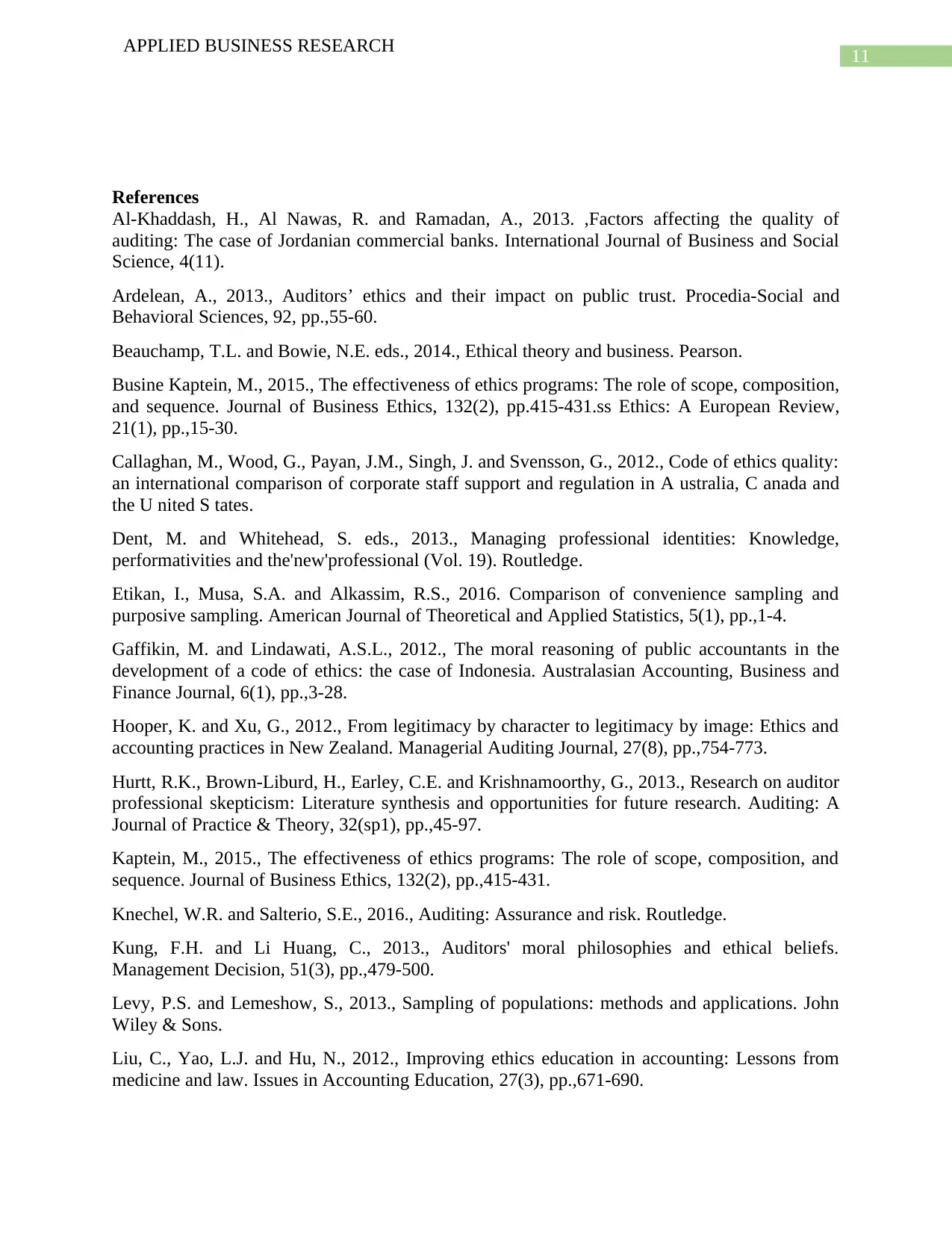
11
APPLIED BUSINESS RESEARCH
References
Al-Khaddash, H., Al Nawas, R. and Ramadan, A., 2013. ,Factors affecting the quality of
auditing: The case of Jordanian commercial banks. International Journal of Business and Social
Science, 4(11).
Ardelean, A., 2013., Auditors’ ethics and their impact on public trust. Procedia-Social and
Behavioral Sciences, 92, pp.,55-60.
Beauchamp, T.L. and Bowie, N.E. eds., 2014., Ethical theory and business. Pearson.
Busine Kaptein, M., 2015., The effectiveness of ethics programs: The role of scope, composition,
and sequence. Journal of Business Ethics, 132(2), pp.415-431.ss Ethics: A European Review,
21(1), pp.,15-30.
Callaghan, M., Wood, G., Payan, J.M., Singh, J. and Svensson, G., 2012., Code of ethics quality:
an international comparison of corporate staff support and regulation in A ustralia, C anada and
the U nited S tates.
Dent, M. and Whitehead, S. eds., 2013., Managing professional identities: Knowledge,
performativities and the'new'professional (Vol. 19). Routledge.
Etikan, I., Musa, S.A. and Alkassim, R.S., 2016. Comparison of convenience sampling and
purposive sampling. American Journal of Theoretical and Applied Statistics, 5(1), pp.,1-4.
Gaffikin, M. and Lindawati, A.S.L., 2012., The moral reasoning of public accountants in the
development of a code of ethics: the case of Indonesia. Australasian Accounting, Business and
Finance Journal, 6(1), pp.,3-28.
Hooper, K. and Xu, G., 2012., From legitimacy by character to legitimacy by image: Ethics and
accounting practices in New Zealand. Managerial Auditing Journal, 27(8), pp.,754-773.
Hurtt, R.K., Brown-Liburd, H., Earley, C.E. and Krishnamoorthy, G., 2013., Research on auditor
professional skepticism: Literature synthesis and opportunities for future research. Auditing: A
Journal of Practice & Theory, 32(sp1), pp.,45-97.
Kaptein, M., 2015., The effectiveness of ethics programs: The role of scope, composition, and
sequence. Journal of Business Ethics, 132(2), pp.,415-431.
Knechel, W.R. and Salterio, S.E., 2016., Auditing: Assurance and risk. Routledge.
Kung, F.H. and Li Huang, C., 2013., Auditors' moral philosophies and ethical beliefs.
Management Decision, 51(3), pp.,479-500.
Levy, P.S. and Lemeshow, S., 2013., Sampling of populations: methods and applications. John
Wiley & Sons.
Liu, C., Yao, L.J. and Hu, N., 2012., Improving ethics education in accounting: Lessons from
medicine and law. Issues in Accounting Education, 27(3), pp.,671-690.
APPLIED BUSINESS RESEARCH
References
Al-Khaddash, H., Al Nawas, R. and Ramadan, A., 2013. ,Factors affecting the quality of
auditing: The case of Jordanian commercial banks. International Journal of Business and Social
Science, 4(11).
Ardelean, A., 2013., Auditors’ ethics and their impact on public trust. Procedia-Social and
Behavioral Sciences, 92, pp.,55-60.
Beauchamp, T.L. and Bowie, N.E. eds., 2014., Ethical theory and business. Pearson.
Busine Kaptein, M., 2015., The effectiveness of ethics programs: The role of scope, composition,
and sequence. Journal of Business Ethics, 132(2), pp.415-431.ss Ethics: A European Review,
21(1), pp.,15-30.
Callaghan, M., Wood, G., Payan, J.M., Singh, J. and Svensson, G., 2012., Code of ethics quality:
an international comparison of corporate staff support and regulation in A ustralia, C anada and
the U nited S tates.
Dent, M. and Whitehead, S. eds., 2013., Managing professional identities: Knowledge,
performativities and the'new'professional (Vol. 19). Routledge.
Etikan, I., Musa, S.A. and Alkassim, R.S., 2016. Comparison of convenience sampling and
purposive sampling. American Journal of Theoretical and Applied Statistics, 5(1), pp.,1-4.
Gaffikin, M. and Lindawati, A.S.L., 2012., The moral reasoning of public accountants in the
development of a code of ethics: the case of Indonesia. Australasian Accounting, Business and
Finance Journal, 6(1), pp.,3-28.
Hooper, K. and Xu, G., 2012., From legitimacy by character to legitimacy by image: Ethics and
accounting practices in New Zealand. Managerial Auditing Journal, 27(8), pp.,754-773.
Hurtt, R.K., Brown-Liburd, H., Earley, C.E. and Krishnamoorthy, G., 2013., Research on auditor
professional skepticism: Literature synthesis and opportunities for future research. Auditing: A
Journal of Practice & Theory, 32(sp1), pp.,45-97.
Kaptein, M., 2015., The effectiveness of ethics programs: The role of scope, composition, and
sequence. Journal of Business Ethics, 132(2), pp.,415-431.
Knechel, W.R. and Salterio, S.E., 2016., Auditing: Assurance and risk. Routledge.
Kung, F.H. and Li Huang, C., 2013., Auditors' moral philosophies and ethical beliefs.
Management Decision, 51(3), pp.,479-500.
Levy, P.S. and Lemeshow, S., 2013., Sampling of populations: methods and applications. John
Wiley & Sons.
Liu, C., Yao, L.J. and Hu, N., 2012., Improving ethics education in accounting: Lessons from
medicine and law. Issues in Accounting Education, 27(3), pp.,671-690.
⊘ This is a preview!⊘
Do you want full access?
Subscribe today to unlock all pages.

Trusted by 1+ million students worldwide
1 out of 16
Related Documents
Your All-in-One AI-Powered Toolkit for Academic Success.
+13062052269
info@desklib.com
Available 24*7 on WhatsApp / Email
![[object Object]](/_next/static/media/star-bottom.7253800d.svg)
Unlock your academic potential
Copyright © 2020–2026 A2Z Services. All Rights Reserved. Developed and managed by ZUCOL.





